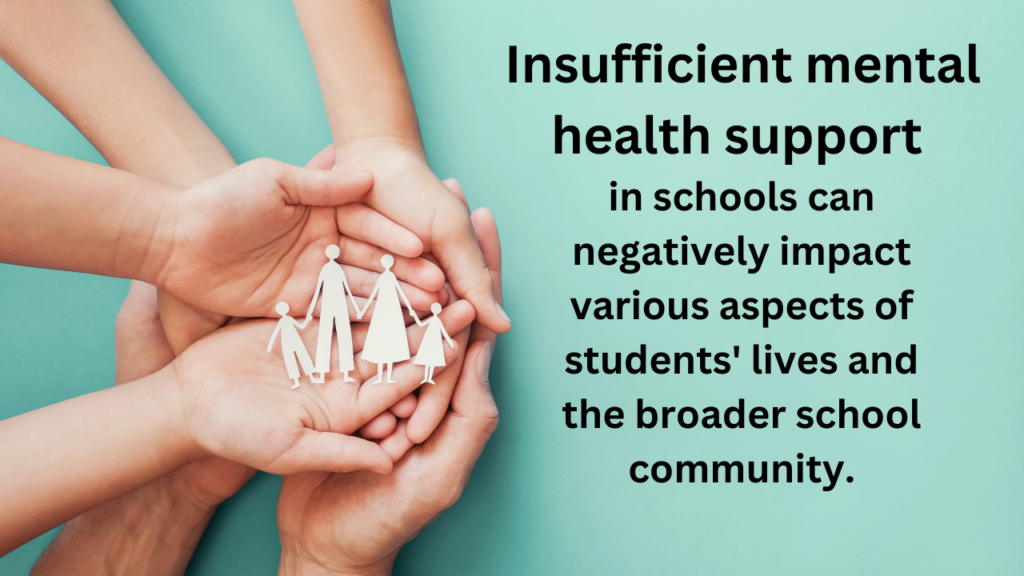In the bustling hallways and buzzing classrooms of today’s schools, there’s an issue often overlooked amid the academic hustle: mental health. As students navigate the pressures of exams, social dynamics, and personal growth, the need for robust mental health support within educational institutions has never been more critical.
Here’s a table exploring the effects of insufficient mental health support in schools:
mental health
| Aspect | Effects of Insufficient Mental Health Support |
|---|---|
| Academic Performance | – Decreased focus and concentration – Lower grades and test scores |
| Behavior | – Increased behavioral issues – Higher rates of absenteeism and truancy |
| Social Skills | – Poor peer relationships – Difficulty in communication and conflict resolution |
| Emotional Well-being | – Increased anxiety and depression – Lower self-esteem and confidence |
| Physical Health | – Higher stress levels leading to physical symptoms (e.g., headaches, stomachaches) |
| Teacher Workload | – Teachers spending more time on behavioral management rather than instruction |
| School Climate | – Negative school environment – Increased bullying and violence |
| Long-term Outcomes | – Higher dropout rates – Poorer career prospects and life satisfaction |
| Family Dynamics | – Increased stress and tension at home – Strain on family relationships |
| Community Impact | – Greater need for community mental health services – Higher societal costs |
look at this table, it provides a comprehensive overview of how insufficient mental health support in schools can negatively impact various aspects of students’ lives and the broader school community.

The Silent Struggle: mental health
Behind the bright smiles and eager faces, many students grapple silently with anxiety, depression, and stress that effect mental health. According to recent studies, yet the resources available to them often fall short. This gap not only impacts their academic performance but also their overall well-being.
Understanding the Impact
Imagine sitting in a classroom, feeling overwhelmed by a wave of anxiety before a test. Or struggling to concentrate on lessons while battling feelings of loneliness or inadequacy. These scenarios are all too common among students who lack adequate mental health support.
Challenges Faced by Students
One of the primary challenges students face is the stigma surrounding mental health. Fear of judgment or misunderstanding often prevents them from seeking help. Additionally, schools may lack trained professionals or sufficient counseling services, leaving students without the guidance they desperately need.
The Role of Educators and Administrators
Educators and school administrators play a pivotal role in shaping a supportive environment for students. By fostering open conversations about mental health, implementing wellness programs, and training staff to recognize warning signs, schools can create a more inclusive and empathetic community.
The Way Forward
Addressing the issue of insufficient mental health support requires a multifaceted approach:
- Enhanced Resources: Schools must allocate more resources toward hiring qualified counselors and mental health professionals.
- Education and Awareness: Educating students, parents, and staff about mental health issues reduces stigma and encourages early intervention.
- Integrated Support Systems: Integrate mental health education into the curriculum and establish peer support networks to ensure students have access to ongoing assistance.

Conclusion
In conclusion, addressing insufficient mental health support in schools is not just a matter of policy but of compassion and understanding. By recognizing and prioritizing the mental well-being of students, we not only enhance their academic success but also nurture healthier, happier individuals ready to contribute positively to society.
As we look to the future, let us advocate for policies and practices that prioritize mental health in our schools. Together, we can create learning environments where every student feels supported, valued, and empowered to thrive.
Look once Mental health is crucial for students because it affects every aspect of their lives:
- Academic Performance: Good mental health enhances focus, concentration, and motivation, leading to better grades.
- Behavior: Supports positive classroom behavior and reduces disruptions.
- Emotional Well-being: Helps manage stress, boosts self-esteem, and fosters confidence.
- Social Skills: Improves relationships and communication with peers and teachers.
- Long-term Outcomes: Contributes to career success and overall life satisfaction.
- Physical Health: Reduces physical health issues related to stress and promotes healthy lifestyle choices.
- Resilience: Builds coping mechanisms and adaptability to challenges.
- School Climate: Creates a positive, safe, and inclusive environment, reducing bullying.
Overall, addressing mental health in schools is essential for students’ academic, social, and emotional development.




